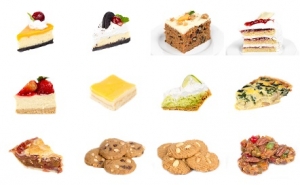“But why?” As a dietitian, it’s a question I’m asked often, particularly if we’re talking about what I like to call, “fun foods,” or foods that might be seen by many in program as “challenge foods.” We include these foods intentionally in the majority of the programming here at Walden in order to dispel common black-and-white eating disorder thoughts that can divide food into dangerous labels like “good” and “bad.”
We live in a culture, though, where we collectively assign such labels, so the confusion is understandable. To help clarify why these foods are included in program meals, and to help you challenge these deeply ingrained black-and-white assumptions about food in your own life, here are some of my thoughts on why it is important to include challenges in your meal plan and how you can even think of them as fun!
Challenge foods or desserts are not “empty calories.” These foods actually provide energy, protein, carbohydrates, and fats (sometimes even calcium) that our bodies need and can use as fuel to get us through our days. Feeling like these foods have no place in the diet is an example of a rigid thought worth challenging. Our bodies will happily use the nutrients from chocolate chip cookies, peach cobbler and or cheesecake.
Incorporating challenge foods in meal plans and in program gives us permission to enjoy these foods. Sometimes it feels like everyone else gets to or should be allowed to eat these foods, but we exclude or set limits for ourselves. Having these foods as a formal part of treatment validates that eating fun foods can be incorporated into everyone’s daily lives.
We need practice eating these foods in a supportive, structured way. Challenge foods can feel overwhelming, but if we expose ourselves to the challenge with the help and support of our treatment teams – either building up to a particular “fear food” or practicing appropriate portions – we’ll feel more comfortable and confident with these foods outside the walls of treatment. Challenge food exposures tend to not be a one-and-done solution: persistence and repetition are key in defusing how emotionally charged these foods have so often become.
Repeated exposures help normalize challenge foods. As many of us know, eating disorders can be very isolating illnesses. Many of my clients report having missed social events or outings due to the anxiety of not knowing what the food environment will look like. Challenging your beliefs and rules around food can help make encountering bagels at a business meeting, a spaghetti dinner with your sports team, or cake at a friend’s birthday party seem manageable.
Nourishment: It’s one of my favorite words in nutrition and really speaks to how food feeds our bodies, minds, and souls. Can you remember a time when you once enjoyed these foods without fear or guilt? Eating is one of life’s pleasures and is such a huge part of so many cultures worldwide, so it is important to encourage ourselves to feel comfortable and even work to enjoy participation in these events.
####
 Meg Salvia, MS, RDN, CDE is the dietitian at Walden Behavioral Care’s Peabody clinic. She sees adolescents and adults in the partial hospitalization program as well as in the binge-eating intensive outpatient program. She is also a board-certified diabetes educator (CDE). She began her career working in research at Joslin Diabetes Center and joined Walden Behavioral Care’s team in 2013. Meg earned a Master’s degree in nutrition from Boston University and a BA in English from Boston College.
Meg Salvia, MS, RDN, CDE is the dietitian at Walden Behavioral Care’s Peabody clinic. She sees adolescents and adults in the partial hospitalization program as well as in the binge-eating intensive outpatient program. She is also a board-certified diabetes educator (CDE). She began her career working in research at Joslin Diabetes Center and joined Walden Behavioral Care’s team in 2013. Meg earned a Master’s degree in nutrition from Boston University and a BA in English from Boston College.







